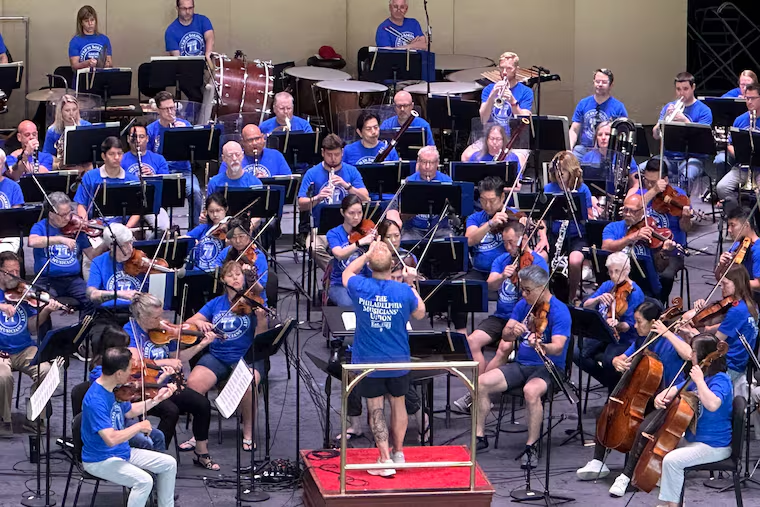Philly Orchestra players reject a new contract as their old one expires
The musicians, seeking higher and better benefits, already took a strike authorization vote last month.

On the day their current contract expired, players of the Philadelphia Orchestra voted to reject a proposed settlement. They say it would have kept them unacceptably below other top class orchestras in pay while giving their bosses even more power.
The orchestra members voted definitively Sunday to reject the Philadelphia Orchestra and Kimmel Center Inc.(POKC)’s “best and final offer,” which came after three full days of bargaining. Eighty-five of the musicians voted against the offer, and two abstained, the union announced Monday. None voted in favor, promoting union calls for a return to the bargaining table.
“The results of this vote send a clear message that Philadelphia’s musicians stand together and will not accept anything less than a fair contract,” said Holly Blake, orchestra contra-bassoonist and member of Local 77 of the American Federation of Musicians’ negotiating committee. “We have been bargaining in good faith with our management, whose decision to suddenly end negotiations on Friday and thrust an offer on the musicians was both insulting and demoralizing. Today we made clear that we are more unified than ever, and stand together for the future of the orchestra.”
Union members said the offer failed to meet their goals of pay parity with the nation’s other top orchestras, along with not adequately addressing their concerns about better retirement benefits, higher pay for substitute musicians, and reduced workplace protections and autonomy.
A spokesperson for POKC management says their settlement offer was a fair one that would have allowed the members income growth.
POKC is offering a 13.5% increase over three years “in one of the most affordable big cities in the nation,” said POKC spokesperson Ashley Berke.
With a strike authorization vote already taken last month and the beginning of the orchestra’s new season less than two weeks away, the players and their bosses don’t seem to agree on much of anything, including which side was to blame for shutting down the negotiations.
What constitutes equitable pay remains a major bone of contention.
Leaders of Local 77 and its representatives say in the last 20 years, orchestra members’ salaries have fallen below their peers in the nation’s top-tier symphony orchestras — eighth among eight in terms of base pay.
Philadelphia’s base salary without other compensations this year was $144,456.
Philadelphia Orchestra management, however, disagrees with the union analysis. They argue the orchestra’s financial ranking should be based not just on their contractual base salary, but also other compensation including electronic media payments which the musicians receive, as do other orchestras. They say the relative cost of living of the different orchestras’ markets should count as well.
In the rejected offer to the musicians, the first-year minimum starting pay — the players’ salary plus electronic media payment — would increase to $161,391 plus a $10,000 signing bonus and increase to $172,887 by the third year. The players would also still be eligible for Musician Appreciation Fund payments from their bosses. “When factoring the cost-of-living adjustment, this offer places them second amongst their peers,” said Berke.
But the musicians’ union, which has said they are seeking to achieve a wage that’s the average of the other premier orchestras, claims the POKC offer wouldn’t even cover the effects of inflation over recent years.
According to a union response to a memo from POKC president and CEO Matías Tarnopolsky to their members, they “are negotiating this contract in the midst of historic inflation. We would need a 13.2% increase in year 1 to account for the effects of inflation on our salary — functionally, a 6% ‘raise’ is a pay cut compared to the start of our last contract in 2019.”
The union’s last proposal sought staggered raises, including a 15% raise in the first year, which would bring the minimum base salary up to $166,140. There would be additional increases over the next two years. Effective March 11, 2026, the base salary would go up to $194,220 or the average of the seven top orchestras, whichever would be higher.
The union members say they need higher salaries to attract top talent to the orchestra, which currently has unfilled vacancies.
“It’s kind of like if you’re the dean of Penn Law School and you want to attract a professor from Harvard. You don’t say, ‘We’re going to pay less because it’s cheaper to be in Philadelphia,’” said Stuart W. Davidson, lawyer for the musicians. “You’re not going to attract young musicians if you pay $30,000 less than Boston.”
The union also maintains POKC can afford the higher compensation under its current financial situation.
Berke, however, said the organization did not meet its fundraising goal for this fiscal year and ticket sales are 25% behind what they were in 2019.
“We remain committed to improving the situation of the musicians of the Philadelphia Orchestra within the economic realities of our organization,” she said. “We are eager to bring this process to a productive and positive resolution.”
There was no word of when the next bargaining session would be. The orchestra is scheduled to perform next on Sept. 20, with the official opening night gala featuring star cellist Yo-Yo Ma slated for Sept. 28.